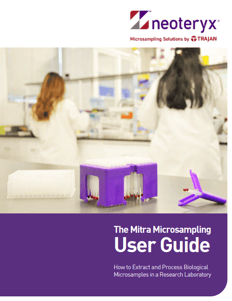microsampling for drug monitoring
Drug monitoring requires routine blood draws that can be burdensome to patients.
New, remote devices can help alleviate this burden and allow for sample collection at home.
Collecting Blood Samples at Home
The use of remote microsampling innovations like the Mitra® device based on VAMS® technology, Mitra® kits, or the hemaPEN® when paired with secure telecommunications has proven to be highly successful in clinical drug trials.
Remote microsampling enables precise patient monitoring during these trials that extends beyond the clinical setting.
Frequently Asked Questions (FAQs)
A key benefit of microsampling for TDM is its convenience for your patients or study cohorts.*
Offering them microsampling devices and supplies for remote blood sample collection enables them to easily collect samples at different time points in the comfort of home.
They can mail their samples from the nearest mailbox to your lab using the pre-stamped, standard size letter (20 mm envelope, <100g total weight). This helps them avoid frequent visits to the hospital or lab, thereby saving time, travel, and exposure to germs.
Cost savings for your TDM program are added benefits of remote microsampling. You can ship out your microsampling packets to patients and cohorts at local postal rates for a standard letter. You also save on staffing costs by eliminating the need for a trained phlebotomist to perform all blood draws. Also, did you know that dried blood microsamples don't require expensive cold-chain shipping? This represents another cost reduction in your TDM program budget!
*Our microsampling devices are CE-IVD (IVDR) registered in the UK, EU and Australia for clinical use. In these regions, the devices can be used both in healthcare programs and research studies.
Yes, our microsampling devices based on volumetric sampling technology are used in therapeutic drug monitoring (TDM) programs around the world. In the EU, UK and Australia, our devices are CE-IVD (IVDR) registered for clinical use. In these regions, our devices are used in both research and healthcare programs.
Our microsampling devices enable remote monitoring, which is beneficial for patients or study participants living in remote areas, and those who must limit their exposure to germs by reducing visits to medical facilities.
Our Technical Resource Library includes a searchable selection of published literature discussing TDM programs and studies that applied remote specimen collection and volumetric microsampling. Type "TDM" or your analyte of interest in the library's search field to find journal articles, presentations and application notes.
Therapeutic drugs are used and monitored in many treatment areas, such as cancer, kidney treatment, organ transplants, neurology, and autoimmune disorders. Close monitoring is often essential to ensure correct drug dosing and to guard against adverse side effects. Remote blood collection offers an accurate, yet more convenient approach to traditional therapeutic drug monitoring that requires visits to hospitals and other facilities for blood draws. Drugs that can be monitored with remotely collected dried blood microsamples include immunosuppressants, antibiotics, anti-epileptics, anti-retroviral agents, and many more.
Many analytes can be extracted using volumetric microsampling, and are compatible with hemaPEN® and Mitra® devices with VAMS® technology. Some of the literature and resources on our website discuss different analytes that have been extracted with our microsampling devices. Type your analyte of interest in our Technical Resource Library search field to find the information you seek.
Sample success rates are high for Mitra® and hemaPEN® devices, which are based on volumetric microsampling. The absorptive VAMS® tips on Mitra can absorb homogenous samples with 99% acceptance rates.* By following the illustrated instructions and demo videos available with hemaPEN and Mitra, end-users can reliably collect fixed volume samples that are precise enough for lab analysis.
These volumetric microsampling devices overcome the hematocrit (HCT) bias that may occur with DBS cards, where non-homogenous blood spots on filter paper have higher variability and higher failure rates.*
*Data on sample success rates are discussed in published research articles in our online Microsampling Resource Library.
Example: https://www.medrxiv.org/content/10.1101/2021.01.27.21250570v1.full
Published research papers show that dried capillary whole blood microsamples collected in 10, 20, or 30 µL volumes are enough for good extraction and analysis. These samples also yield high-quality data that are similar to data from venous blood. The literature provides case examples of microsampling in research applications. Visit the Technical Resource Library to review many comparative studies that describe what others have achieved with microsampling in their research.
While we are exploring this capability as a future advance in the microsampling industry, traditional wet blood samples and conventional phlebotomy to draw venous blood are still used for most standard health panels and the complete blood count (CBC). Most health systems are still set up to process high-volume liquid blood samples for these standard tests.
 Microsampling User Guide
Microsampling User Guide
This technical user guide is designed to get you started with microsampling. The printed guidance from our technical director helps you make initial decisions on best practices for achieving solid analytical validations in your research projects. What microsample volume is needed for your assay? What analyte classes are compatible with microsampling? How do you process microsamples in the lab? Download the guide to find answers to these questions, and more!
TDM Blog Listing
Explore our curated selection of TDM blogs to learn about the different health and research programs where remote microsampling is being applied. Click the button below to explore our blogs on remote patient monitoring, gathered together in a single listing for you.
Podcast Interview
Dr. Florian Lemaitre, an Assistant Professor in Pharmacology at Rennes University Hospital’s School of Medicine in France, discusses therapeutic drug monitoring, or TDM. He monitors patients taking immunosuppressive and antiretroviral drugs remotely via at-home blood microsampling.
Gain Access to the Microsampling Resource Library!
How do others use microsampling in drug monitoring programs to keep vulnerable people safe at home? Gain access to our Microsampling Resource Library to read study papers and case studies from your peers who are driving successful monitoring programs with remote sample collection!


